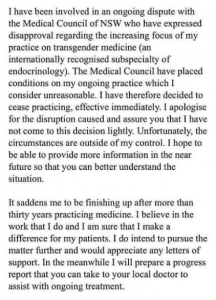An endocrinologist who specialises in serving the transgender community has closed his practice at short notice following what he says is a dispute with the Medical Council of NSW.
Dr Jonathan Hayes practised in Sydney’s St Leonards and was known as one of the few endocrinologists to provide hormone implants for transgender women and testosterone for transgender men.
However in a statement circulated to patients and Transgender Health on 13 June, Dr Hayes said he had decided to cease practice after 30 years.
 He attributed his decision to an ongoing dispute regarding the Medical Council’s disapproval of his increasing focus on transgender medicine, and which has now led to it placing unreasonable conditions on his practice.
He attributed his decision to an ongoing dispute regarding the Medical Council’s disapproval of his increasing focus on transgender medicine, and which has now led to it placing unreasonable conditions on his practice.
Whilst the nature of these conditions is unknown, Dr Hayes has strenuously denied any professional wrongdoing and stated that “there have been no reported negative patient events or outcomes, despite recent media speculation” and no evidence to show he has any impaired capacity to practice medicine.
Many of his patients have called for him to reconsider his decision and have formed a “Save Jon Hayes” Facebook group.
The Medical Council of NSW subsequently issued a statement on 14 June, which it said was in response to “inaccuracies” in social media commentary on the issue by the transgender community. The Council denied that it was in a dispute with Dr Hayes or that it had placed any conditions on his medical registration.
“The Council understands Dr Hayes made a personal decision to cease practising and informed his patients of this decision earlier this week,” it said.
However Dr Hayes said he was offended by “highly provocative” insinuations within the Council statement, which said it was commenting “in the interest of the health and safety of the public” and highlighting the Council was a regulatory body responsible “for protecting public safety by ensuring medical practitioners are fit to practise”.
Dr Hayes also took exception to the Council’s statement that he should “take steps to ensure immediate continuity of care for former patients”.
“This is a very ignorant statement,” he wrote. “The reality is that transgender medicine is a neglected area of healthcare and I am therefore being charged with the impossible task of finding alternative services for my patients when none exist.”
Dr Hayes said he had 7962 patients on his books with an additional 24 new patients booked into the clinic over the next month.
The Medical Council of NSW claimed it has “never expressed disapproval or a view of a recognised medical sub-specialty, including transgender medicine”.
The Endocrine Society of Australia stated that as a non-regulatory body, it has not had any involvement with the case, with Dr Hayes not being one of its members. However the Society expressed its support for transgender medicine.